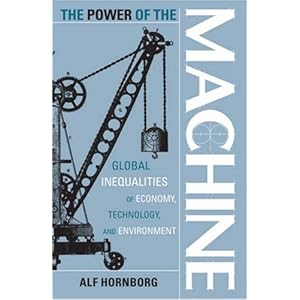 We begin with the work of Swedish anthropologist Alf Hornborg and, in particular, the arguments in his book The power of the machine : global inequalities of economy, technology, and environment. From world-systems theory Hornborg takes the conclusion that global society manifests aspects of a zero-sum game, i.e. that the gains of one region come at the expense of another. It is this idea that Hornborg sees as the fundamental factor underpinning the creation of world-systemic structures based around developed cores and less developed peripheries -- that the development of the core is built in part on the exploitation of the periphery.
We begin with the work of Swedish anthropologist Alf Hornborg and, in particular, the arguments in his book The power of the machine : global inequalities of economy, technology, and environment. From world-systems theory Hornborg takes the conclusion that global society manifests aspects of a zero-sum game, i.e. that the gains of one region come at the expense of another. It is this idea that Hornborg sees as the fundamental factor underpinning the creation of world-systemic structures based around developed cores and less developed peripheries -- that the development of the core is built in part on the exploitation of the periphery. But how do you measure exploitation? Traditional economics argues that exchanges between the core and the periphery are accurately measured by market prices and, hence, there is no exploitation; the core country pays $100 to the periphery country for each $100 worth of raw material it receives. Traditional world-systems theory builds on Marxist economic principals to argue that market prices aren't an accurate representation of the exchange and to show how such exchanges are economically unequal. Hornborg notes, correctly, that economics as a discipline finds the Marxist accounts wanting. Thus, he wants to develop an alternative metric for measuring the exchanges. It is here that Hornborg turns to ecology and, in specific, the implications of the second law of thermodynamics to propose a thermodynamics of imperialism, i.e. an ecology of unequal exchange.
Central to his argument is the concept of "technomass" which I'll take up in a future post.
No comments:
Post a Comment